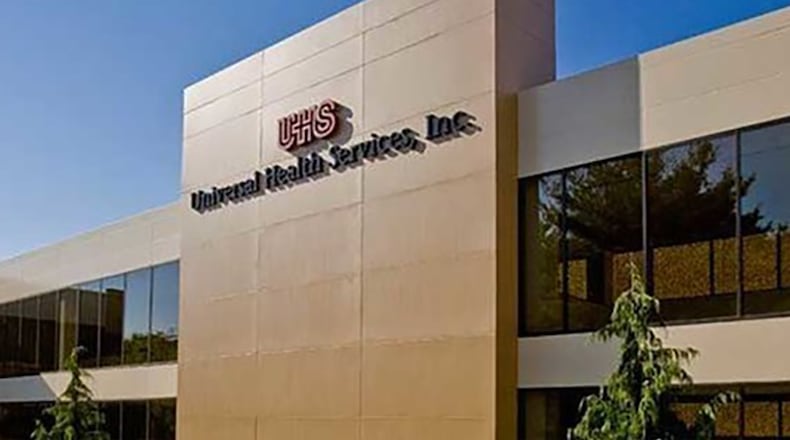A company that runs mental health and substance abuse treatment centers in Georgia and other states will pay $122 million to settle more than a dozen federal whistleblower lawsuits alleging numerous violations, including that it admitted people who didn’t need to be hospitalized, kept patients longer than necessary and routinely used drugs to sedate and chemically restrain patients.
Universal Health Services will pay $117 million to resolve allegations its facilities falsely billed Medicare and other government health programs from 2006 through 2018 for medically unnecessary and inappropriate services. The settlement includes a case that accused the company’s psychiatric facility in Atlanta, Anchor Hospital, of using chemical restraints to discipline patients.
In a separate suit settled for $5 million at the same time, a whistleblower accused Universal Health Services’ Turning Point Care Center in Moultrie of luring patients from around the country to receive detox treatment by offering to pay for or discount their travel, and then of inducing them to remain for outpatient care by providing free or discounted lodging at furnished apartments or houses.
The settlement also requires the company to enter a five-year corporate integrity agreement for federal oversight of its operations.
Universal Health Services, a for-profit public company which runs about 30 psychiatric facilities involved in the settlement, did not admit to any wrongdoing in agreeing to settle.
“UHS was eager to resolve this matter to avoid future distractions and the high costs of litigation,” the Pennsylvania-based company said in a statement to The Atlanta Journal-Constitution.
The company also said it “unequivocally disputes any allegation that it engaged in wrongdoing of any kind.
“Investigations of this nature are an unfortunate reality facing the healthcare and hospital provider industry” because they rely so much on government funds, the company said.
In its statement, UHS also said that it prioritizes “high quality, evidence-based patient care delivered by compassionate clinicians who determine appropriate treatment and care based on the individual needs of each patient.”
Under the settlement, the federal government will receive about $88 million, and about $28.8 million will be returned to states, which jointly fund Medicaid programs.
"My clients are happy that these claims saw the light of day and became public, to possibly prevent the same thing from happening to other patients — any patients at any hospital." —Raymond Moss, lawyer whose firm filed one of the lawsuits against UHS
The 36 whistleblowers who filed the original 19 False Claims Act lawsuits will split $15.9 million from the federal government’s share of the settlement. At least 10 of the whistleblowers originally filed suit in Georgia. Some of the suits remain sealed.
Raymond Moss of the Moss and Gilmore law firm filed one of the lawsuits against UHS on behalf of clients who live in Georgia. “My clients are happy that these claims saw the light of day and became public, to possibly prevent the same thing from happening to other patients — any patients at any hospital,” Moss said, stressing the importance of the False Claims Act and the federal government’s strong engagement.
An attorney for the whistleblowers at Anchor Hospital, former UHS employees Kenneth Russell and Yvette Gates, said they were satisfied with the settlement. “They’re satisfied that this wrongdoing has been revealed,” said Larry Golston, their Montgomery-based attorney at the Beasley Allen firm.
Russell and Gates claimed in their lawsuit that Anchor staff were pressured to conduct diagnostic psychiatric assessment in 30 minutes, while Anchor billed the federal government for one to two hours. They alleged that these abbreviated and quick diagnoses allowed for UHS and Anchor to routinely admit patients based on a financial objective, to make money by getting Medicare and Medicaid patients in a hospital bed at Anchor — in spite of the fact, they alleged, that most of the patients did not experience psychosis or were not mentally ill at admission.
UHS was under criminal investigation at one point, but federal prosecutors dropped the criminal case when the company last year announced an agreement in principle to settle the lawsuits, the earliest of which were filed in 2012.
Substance abuse treatment has become a wellspring of questionable practices, particularly during the opioid epidemic, as insurance companies and Medicare and Medicaid have covered addiction treatment and businesses have opened to take advantage of the possibilities.
This is the latest of several Medicare fraud cases involving Georgia healthcare providers that were recently resolved. In June, Piedmont Healthcare agreed to pay $16 million to settle a whistleblower lawsuit alleging that the system overbilled Medicare and Medicaid for cardiac care and illegally paid kickbacks to doctors who referred heart patients to its hospitals. Also in June, Augusta University Medical Center agreed to a $2.6 million settlement with federal prosecutors who alleged it submitted false Medicare and Medicaid billing statements.
In March, executives of STG Healthcare, a hospice, agreed to pay $1.75 million after they were accused of submitting false claims to Medicare and Medicaid for patients who were not terminally ill and so didn’t qualify for hospice care.
None of those health organizations admitted to wrongdoing in the settlements.
The largest settlement in Georgia for any False Claims Act cases was in 2016, when Tenet Healthcare Corp. and two of its Atlanta-area subsidiaries agreed to pay more than $513 million to resolve claims they paid kickbacks for patient referrals.
About the Author
The Latest
Featured


